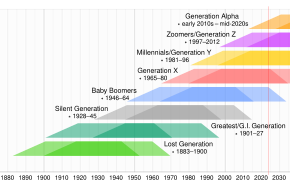Generation Z
(Redirected from Gen-Z)
| Part of a series on |
| Social generation s of the Western world |
|---|
 |

Generation Z (also known as Gen Z for short, or Zoomers) is the generation after Millennials and before Generation Alpha. The majority of government sources define Generation Z as those born from 1997 to 2012.[2][3] In a 2022 report, the U.S. Census designates Generation Z as those born 1997 to 2012.[4] Most members of Generation Z have used digital technology since a young age and are well known with the Internet and social media. Most members of Generation Z are the children of Generation X.[5]
Other proposed names for the generation included iGeneration, Gen Tech, Gen Wii, Homeland Generation, Net Gen, Digital Natives, and Plurals.[6]
References[change | change source]
- ↑ "How Gen Z Impacts Urban Mobility". Meeting of the Minds. 14 October 2019.
- ↑ Burclaff, Natalie. "Research Guides: Doing Consumer Research: A Resource Guide: Generations". guides.loc.gov. Retrieved 21 April 2022.
- ↑ Government of Canada, Statistics Canada (27 April 2022). "A generational portrait of Canada's aging population from the 2021 Census". www12.statcan.gc.ca. Retrieved 18 July 2022.
- ↑ Bureau, US Census. "2019 Data Show Baby Boomers Nearly 9 Times Wealthier Than Millennials". Census.gov. Retrieved 18 February 2023.
- ↑ Wellner, Alison Stein (September 1, 2000). "GENERATION". Ad Age. Retrieved January 19, 2020.
- ↑ Horovitz, Bruce (4 May 2012). "After Gen X, Millennials, what should next generation be?". USA Today. Archived from the original on 20 March 2020. Retrieved 24 November 2012.
